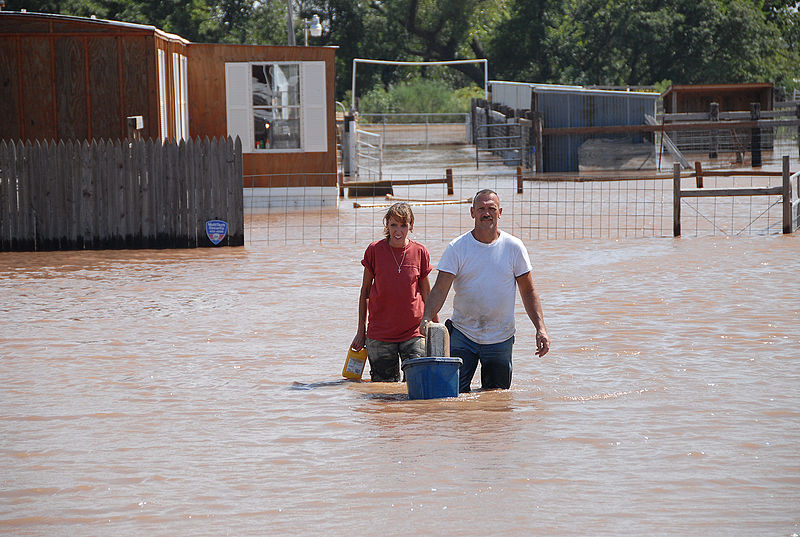Daily Office Readings for Friday, November 8, 2019:
AM Psalm 69:1-23(24-30)31-38; PM Psalm 73
Ezra 7:27-28, 8:21-36; Rev. 15:1-8; Matt. 14:13-21
“Save me, O God, because the waters have risen up to my neck.”
Have you ever noticed how the head and neck are the dividing line between the difficult and the catastrophic? If we’re angry and say, “I’ve had it up to HERE!” we almost always either make a slashing motion across our neck or sharply put our hand over our head and make a chopping motion. If we describe ourselves as “Ok from the neck down,” we may well have a serious physical problem going on, but we’re saying our attitude is still hopeful. We never say, “Arrgh! That guy annoys me, he gets inside my liver on a regular basis and I know he shouldn’t.” (The major exception, interestingly enough, is sometimes we give credence to our…um…backsides being as equally powerful as our heads, with phrases such as, “He is such a pain in the…”. We do tend to use a different word than head or neck on that one…)
The Psalmist is clearly scared, afraid, and overwhelmed. We know it from the first line on out. As we read on, we also deduce the Psalmist deeply feels no one is listening. Depending on how you count it, an appeal is made to God at least sixteen times in this psalm–and no evidence of an answer appears. At first, we hear desperate appeals and a description of horrible treatment by others. (That line, “Those who sit at the gate murmur against me, *
and the drunkards make songs about me” pretty much spells it out, doesn’t it?)
In the next stanza, we see how quickly we often blame ourselves for “having gotten into this situation to begin with” The Psalmist’s shame hangs heavy in the air, even if it might be misguided shame as a response to trauma. Feeling overwhelmed too often leads to self-flagellation.
As the Psalmist continues, though, we see a common reaction to misplaced grief or pain when we get tired of kicking ourselves–lashing out at those who torment us. The Psalmist doesn’t mince words, either–even to the point of imploring God to blot the enemy’s name out of the Book of Life. When we hear epithets at that level, we know there is significant pain and fear involved, that, if it rises any more, it will drown us.
Yet…after a while, satisfying as cursing one’s enemies can be at first…it, too can become stale and tiring after a while. It becomes more effort to remain that angry, than it would have been to start to move through it. Eventually the Psalmist comes to a place where the realization that it is not an answer from God that lifts us, it’s the relationship with God “as is” in times of trouble. When we are in over our head with the pain and disappointment of life, so often we implore for a specific fix when it is actually the sense of God being with us, that heals us. We aren’t ready to hear that at first, and if we wish, we can choose never to let go enough to find that realization. Even when we are ready, even if we sense God is with us in our desperation, it can be a hard slog to get to a place of respite. It is never a short journey when we are moving from a place of panic to a place of spiritual balance. Even if the flood is subsiding, any quick rise of water will take us right back to the opening of Psalm 69 and all the pain and fear that place seems to own.
Interestingly, the Biblical evidence is that Jesus knew this psalm well. He quotes from it or alludes to it in John 2:17 and John 15:25. It also undergirds his death on the cross when he says he’s thirsty and receives sour wine to drink. John wants us to see that Jesus was not immune from the feeling of desperation that comes with being over one’s head. John will go on in his account of the Resurrection, though to reveal that Jesus has the power to melt death’s shackles.
The short version is even when we cannot hear God in our abject fear and in the pain of being overwhelmed, Jesus gets it, because Jesus has been there too. As Easter people, we know there is resurrection at the end of the tunnel of our own pain and are not abandoned in what feels like death, because there was resurrection for Jesus at the end of his own tunnel of pain and death. Sometimes the water IS up to our necks–but Jesus remains alongside us. How might each of us be called to shine a glimmer of the Source of Light in the well of another’s pain?
——-
Couple wading flood waters in Oklahoma, courtesy of Wikimedia Commons.
——-
Maria Evans splits her week between being a pathologist and laboratory director in Kirksville, MO, and gratefully serving in the Episcopal Diocese of Missouri , as the Interim Pastor at Christ Episcopal Church, Rolla, MO.

